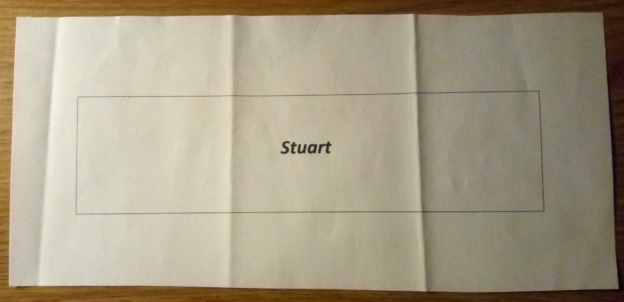At StoneWater we are blessed in having some sangha members who are fine writers and who are able to share and reflect, often in very personal ways. Here’s a lovely piece by Stuart Gendai Hollyoak who explores the idea of intrinsic value. The ‘Identity of Relative and Absolute’ says that each thing ‘has its own intrinsic value’, but what does this mean for me in my life asks Stuart?
Intrinsic Value
‘In the cabinet by my desk I keep folded slips of paper with my name on one side and a compliment on the other. When I trained as a counsellor I was given these slips at the end of a residential as a souvenir of the work I did on myself. Each one was given in secret and left unnamed (but I could tell by the handwriting who wrote what).
What baffled me most about their words was how I could be something, such as kind, without ever being deliberate about being kind. In the incessant dialogue I have with myself, where the same mishmash of words are recycled over and over, the word kinddoesn’t come up. And yet 4 people said I was, so I began to see that my thoughts about anything, especially myself, aren’t all there is.
In service we chant that each thing has its own intrinsic value, but what do we mean? What does intrinsic value mean within the context of my life? Intrinsic value says to me that I’m fine justas I am. But in the relative world of opposites where my mind has the infinite capacity to complicate and misunderstand things I’m not fine for long. Most of all I misunderstand myself.
When I went to college I remember on the first day I came to class most of the people were already sat at tables and I sat at theempty one closest to the board because I was too shy to approach anyone. Just before class started two girls joined me and I could tell by their ease with one another that they knew each other. I remember how they beheld me with broad warm smiles. To break the ice our teacher gave each table a task and at the end one person from each group had to speak aloud to present their table’s findings. I nominated myself to speak and when it was our turn I lost my nerve halfway through and the two girls finished my sentence for me.
The next day they sat on a different table. (‘Did I do something wrong?’) From afar it looked like the cool table. They got along with one guy who loved death metal and weed and who sometimes when he was stoned would explode with infectious belly laughs. And so it began.
I think throughout college I had the wrong end of the stick and thought they had to be the ones to change, not seeing that all along it was I who was scaring them off because I believed they had already made their minds up about me. So the bruised and jumbled self that emerged from those two years was already based on delusion.
In my first job I had a crush on one of my colleagues. We met around Christmas when I worked overtime in the evenings and she was on the boys department folding shirts and pyjamas. I didn’t think much of her at first, but she was scouting for a man and one afternoon in a corridor she called my name and waved me goodbye in such a way that I fell for her.
One day she’s swapping caps from one shelf to another and asecurity guard comes to the tills escorting cashiers from upstairs on the afternoon cash run. He was well built, tall enough and sure in himself. They eventually flirted and, of course, I became insanely jealous so I did something drastic to get her attention. When she passed me behind the tills I tapped her on the arm and nodded towards to the guard. ‘So what’s going on with you and that security guard then?’ She smirked in a way I’d never seen before. ‘Nothing.’ Then, a minute or so later, the popular supervisor came over, stood by my side without looking at me, as though we were conspiring, and said, ‘Something’s definitely going on.’ I was gobsmacked. Behind my till I threw away what I thought of as myself so I could reach my colleague, however briefly, and I did.
I used to ask myself ‘do people only like me when I pretend to be someone I’m not?’ But that question implies that I know who I am, which I don’t. I used to define myself most of all by the temperament I was born with, but to define myself by anything at all leaves me uncomfortable (‘is that all I am?’) It’s as though the act of defining restricts me whereas leaving myself undefined keeps the channels open.
On a weekend residential in North Wales I went with my counselling class to an obstacle course a few miles away from our hotel. Our tutors intended for us to bond through our mutual distress. For the last obstacle three of us had to climb a twenty foot pole and stand together on the top. One of my friends was terrified of heights but agreed to go up if I went first. When we both got to the top the pole began to sway and I held her close while she screamed. The rest of the class below cheered us on and held our support ropes until at last the three of us stood huddled, shaking and exhilarated.
At lunch afterwards my friend said I was the first man she ever trusted.’
Stuart Gendai Hollyoak

